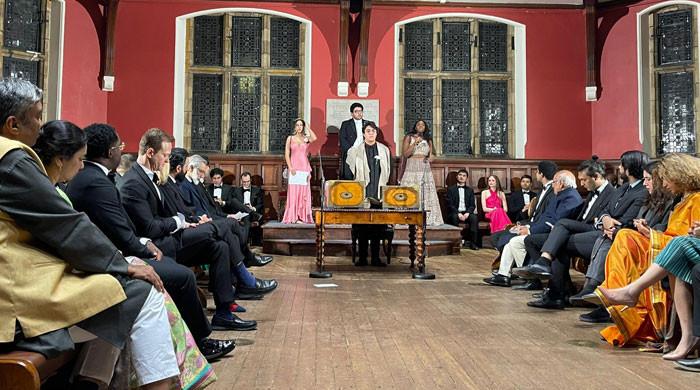LONDON: The Oxford Union, known for its tradition of engaging in contentious global discussions, hosted a debate on the motion titled: “This House Believes in an Independent State of Kashmir.”
While the event was intended to foster dialogue on one of the world’s most polarising territorial disputes, it has drawn significant backlash from Indian media, with allegations of bias and accusations directed at specific individuals within the Union.
The debate highlighted diverse perspectives on the Kashmir issue but also became the epicentre of a media storm. Prominent Indian personalities declined invitations to speak, citing the motion as “offensive and anti-India,” while protests erupted both outside the Union and online.
Defence Minister Khawaja Asif was scheduled to speak at the debate but pulled out after Indian speakers decided not to join the debate.
Those supporting the motion argued that the Kashmir conflict is rooted in decades of broken promises, military occupation, and the denial of fundamental rights to the people of Indian Illegally Occupied Jammu and Kashmir (IIOJK).
Key points raised included: the right to self-determination; Kashmiris were promised the right to determine their future through a plebiscite under United Nations resolutions, a promise that remains unfulfilled; demographic engineering; the Indian government was accused of deliberately altering the region’s demographics by encouraging settlement policies to undermine the Muslim-majority population; militarisation and human rights abuses; and Kashmir was described as the most militarized region in the world, with speakers citing reports of widespread human rights abuses, including property destruction, arbitrary detentions, and sexual violence by Indian armed forces.
While the debate sparked discussions on the Kashmir conflict, it also became a flashpoint for controversy involving individual members of the Oxford Union. Israr Khan, a Pakistani-origin student, was accused by the Indian media of using the debate to propagate anti-India rhetoric.
These accusations, which Khan has not publicly addressed, have fuelled an atmosphere of tension and suspicion within the Union and beyond.
The controversy extended to Oxford Union President Ebrahim Osman-Mowafy, an Arab Muslim student, who faced a no-confidence motion filed by critics accusing him of enabling the debate. The motion is perceived by some as a politically charged move, reflecting the intersection of identity politics and international tensions.
Protests were held outside the Union, with demonstrators from both sides of the issue voicing their views. Supporters of the debate argued that the Union has a duty to provide a platform for free speech and open dialogue, even on controversial topics. Opponents, however, accused the Union of legitimizing anti-India propaganda and creating a biased narrative.

